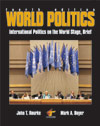Any discussion of how international systems operate must also address the concept of balance of power. There are variations in the precise way that scholars use the term and there is broad disagreement about the degree to which balance-of-power politics does and should affect world politics that relate to the realist-idealist debate discussed in Chapter 1. In essence, realists believe that the practice of politics is necessary and proper; idealists disagree on both counts. Whatever one's views, though, it is important to look at the assumptions of balance-of-power theory and their impact on world politics. Fundamentally, those who believe in the efficacy of balance-of-power theory assume that: 1. There is a possibility, and perhaps a natural tendency, for some states to seek regional or even global hegemony. 2. Other states will seek to prevent hegemony by strengthening themselves or entering antihegemonic alliances with other threatened states. 3. A balance of power, therefore, is desirable because it (a) preserves the independence of countries and (b) creates an equilibrium that promotes order and peace. Balance-of-power theory is applicable to any of the polar configurations, but it is most often associated with multipolar systems. Advocates of balance-of-power politics also believe that leaders will be well advised to continue to practice its principles in the evolving power politics is outmoded because of such factors as the growth of international organizations and independence and that power politics is a failed and increasingly dangerous way of trying to achieve stability and peace. Henry Kissinger, for one, counsels that "in the next century American leadership will have to articulate for their public a concept of the national interest and explain how that interest is served--in Europe and in Asia--by the maintenance of the balance of power."1 Notes 1. From Kissinger's 1994 book, Diplomacy, quoted in Newsweek, April 11, 1994, p. 42. | 


 2002 McGraw-Hill Higher Education
2002 McGraw-Hill Higher Education